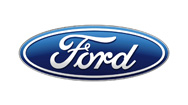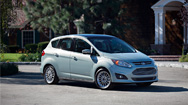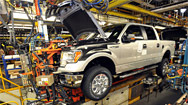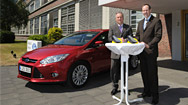South American Policy
In Brazil, our largest South American market, the use of biofuels is a national policy. All gasoline is blended with 20 to 25 percent ethanol, and pure ethanol is extensively used as motor fuel. Most new vehicles are designed to accommodate varying amounts of ethanol. Also, a minimum of 5 percent biodiesel must be added to diesel.
Brazilian emission requirements are periodically updated through an emissions-control program. Brazil also introduced a voluntary vehicle energy-efficiency labeling program; the labels indicate fuel consumption rates for light-duty vehicles with a spark-ignition engine. While the program is voluntary, Brazil also published a new automotive regime that requires participation in the fuel-economy labeling program, as well as a minimum 12 percent improvement in industry-wide fuel efficiency for 2017 light-duty vehicles with a spark-ignition engine, in order to qualify for industrialized products tax reduction. Additional tax reductions are available if further fuel-efficiency improvements are achieved. A star ranking for light vehicles was also recently introduced, favoring low-emission, low-carbon-dioxide (CO2), ethanol, flexible-fuel and hybrid vehicles. Diesel use in light vehicles under a one-ton payload is not allowed in Brazil, except for combined-usage vehicles with special off-road characteristics. Ten Brazilian states have issued Vehicle Pollution Control Plans and are taking actions to implement In-Use Vehicle Inspection and Maintenance Programs.
In 2012, most of Ford’s light-duty products in Brazil were offered as ethanol flexible-fuel vehicles. The most recent vehicle line to offer this was the Ford Ranger, which now comes in a 2.5L ethanol flexible-fuel version. Some imported vehicle lines, including the 2013 Ford Fusion, will also come in a flexible-fuel version in Brazil. We also provide light- and heavy-duty vehicles that meet biodiesel requirements.
Other South American countries, such as Argentina and Colombia, are also significantly increasing the use of biofuels. And, Chile introduced requirements that the fuel-consumption and CO2-emissions levels of light-duty vehicles be posted at sales locations and in owners’ manuals beginning in February 2013.










